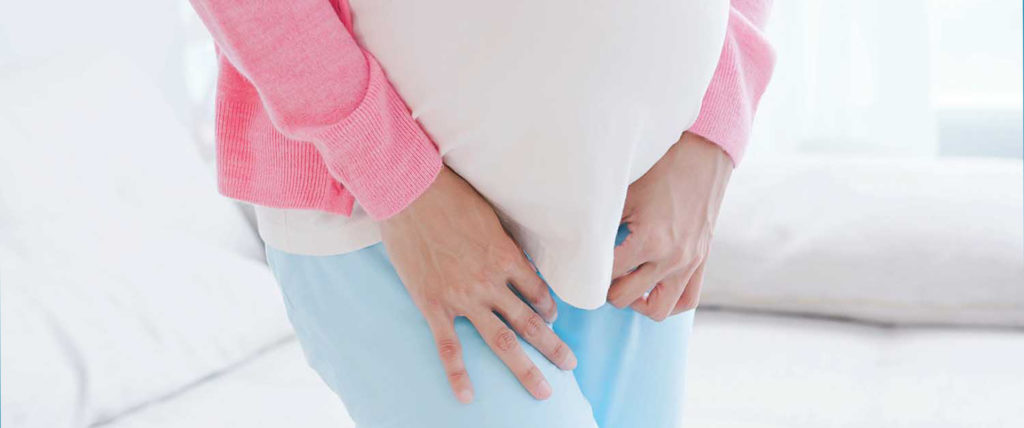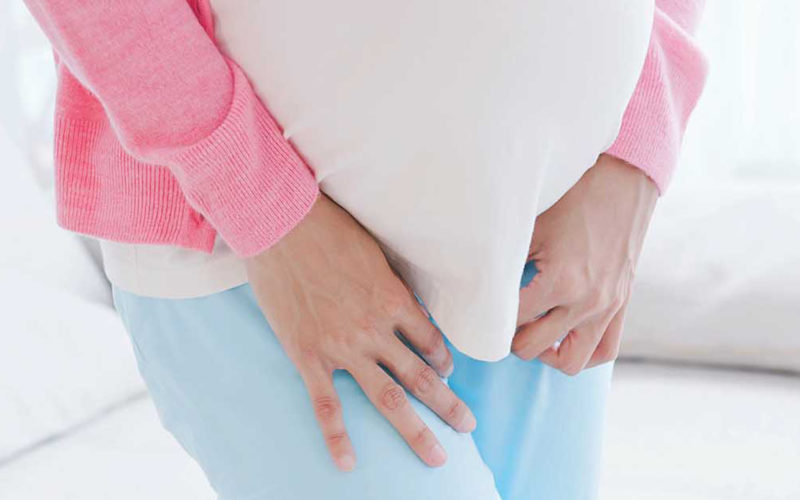Urinary incontinence (leak) occurs when an individual faces difficulty in managing their bladder. Those who suffer from incontinence may experience a strong urge to urinate or may involuntarily leak urine in between visits to the restroom.
Additionally, they may find themselves needing to use the toilet more frequently. Various factors such as pregnancy and childbirth, can contribute to bladder control issues.
Fortunately, incontinence during pregnancy is typically temporary. Generally, resolves within a few months after giving birth, bladder control tends to return to normal.
Stress urinary incontinence (SUI) is the most common type of incontinence observed during pregnancy. SUI manifests as the involuntary leakage of urine during cough, sneeze, laugh, or even performing basic physical tasks like walking.
Additionally, women may also encounter urge urinary incontinence (UUI). UUI involves the involuntary contraction of the bladder muscles, leading to an abrupt and uncontrollable urge to urinate. This urge can be so intense that pregnant women may rush to the toilet, only to discover that they have already leaked urine before making it on time.
Signs and symptoms of pregnancy incontinence

It is not uncommon to experience bladder control issues at some point in our lives. However, during pregnancy, these issues can become more frequent and noticeable. As early as the first trimester, pregnant women may begin to notice changes in their bladder control. As the pregnancy progresses, the likelihood of experiencing these issues increases.
Signs and symptoms include:
- Experiencing dribbling during episodes of coughing, sneezing, laughter, or physical exertion is a common occurrence.
- Sensing an immediate need to urinate and being unable to suppress it.
- Requiring more frequent visits to the restroom.
- Experiencing leakage or dribbling episodes in between visits to the restroom.
Factors that contribute to the loss of bladder control during pregnancy
Pregnancy brings about changes in the body that are conducive to fetal growth, but not so much for bladder control. The uterus, located behind the bladder, can exert pressure on it, reducing its capacity to hold urine.
Hormonal changes during pregnancy also cause the pelvic floor muscles that support the bladder to weaken and loosen, making it harder to control the urge to urinate. When progesterone levels increase, it leads to an improvement in muscle flexibility. This improved flexibility allows your body to adapt to the growth of the developing fetus and, when the time is due, facilitate the delivery of a baby.
The weakening of pelvic floor muscles can make it more difficult to control the bladder when the need arises.
Risk factors for incontinence during pregnancy
Women who experience bladder control issues before pregnancy may find that these problems persist or become severe during pregnancy. Additionally, pre-existing bladder conditions such as recurrent urinary tract infections can contribute to bladder control difficulties.
Other factors that increase the risk of bladder control problems during pregnancy such as:
- The risk of urinary incontinence is greater for those who are overweight or obese.
- Individuals who are older than 30 when they have their first child are more likely to experience stress urinary incontinence (SUI).
- Vaginal deliveries are more prone to result in post-pregnancy incontinence problems.
- Vaginal delivery of a baby weighing over 4 kg at birth may pose an increased risk of neuromuscular weakness during the delivery.
- The risk of UUI may be increased by certain foods and drinks (caffeinated beverages, alcohol, carbonated drinks, spicy foods) that can irritate the bladder.
Diagnosis for incontinence during pregnancy
It is not uncommon for pregnant women to experience urinary incontinence, but many choose not to inform their healthcare providers.
Pregnant women should inform their healthcare providers if they are having bladder control problems. They can suggest ways to help manage the issue.
Typically, bladder function returns to normal after pregnancy. Tests to check for urinary incontinence include:
- Bladder stress test
- Pad test
- Bladder ultrasound
- Urinalysis, urine culture
- Urodynamic testing
Management of urinary incontinence during pregnancy
There are several techniques women can adopt to improve their bladder control during pregnancy. One such method involves the practice of Kegel exercises, which effectively strengthen the pelvic floor muscles responsible for supporting the bladder.
To perform Kegel exercises,
- Contract the muscles that would be used to halt the flow of urine or prevent the release of gas.
- Avoid engaging the muscles in the legs, buttocks, or abdomen.
- Maintain this contraction for a steady count of 10 seconds, and then proceed to relax. Repeat this squeezing and releasing pattern 15 times to complete one set of Kegels.
- Finally, perform four additional sets, resulting in a total of five sets.
The practice of Kegel exercises can improve control over the muscles involved in childbirth and promote tissue recovery after pregnancy. It is advisable to seek advice from a healthcare provider to ensure that these exercises are safe.
Lifestyle changes to improve bladder control include:
- Opt for beverages that are decaffeinated or water-based. Additionally, avoid consuming foods that are either spicy or highly acidic.
- Consider reducing fluid intake after dinner. This can help minimize the need to use the bathroom during sleep hours.
- Incorporate high-fiber foods in diet to help prevent constipation during pregnancy and alleviate the strain on bladder, which can lead to leakage.
- Maintain healthy weight during pregnancy to reduce the risk of incontinence.
- Gradually increase the intervals between bathroom breaks in order to train the pelvic muscles to improve their ability to retain urine.
Throughout pregnancy, the body undergoes physiological changes that can result in heightened challenges in bladder control. It is not unusual for women to encounter instances of involuntary urine leakage when they cough or sneeze unexpectedly. Furthermore, they may struggle to hold urine or experience a frequent urge to use the restroom. By incorporating Kegel exercises, making dietary modifications, and sticking to a regular bathroom schedule, these symptoms can be effectively controlled.
At the forefront of kidney care, NU Hospitals in Bangalore is a top-tier medical facility that specializes in nephrology and urology. It is known for its advanced medical practices and treatments for pregnancy-induced incontinence.

